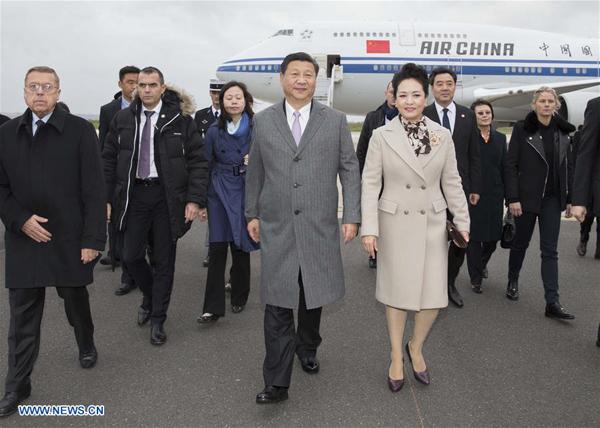Xi arrives in Paris for climate change conference
Xinhua, November 30, 2015 Adjust font size:
|
|
|
Chinese President Xi Jinping, accompanied by his wife Peng Liyuan, arrives in Paris, capital of France, to attend the opening ceremony of an international conference on climate change, Nov. 29, 2015. [Xinhua/Huang Jingwen] |
Chinese President Xi Jinping arrived in Paris on Sunday to attend the opening ceremony of an international conference on climate change.
Xi, accompanied by his wife Peng Liyuan and other senior officials, arrived in the French capital as guest of French President Francois Hollande and Laurent Fabius, France's foreign minister and chair of the 21st session of the Conference of the Parties (COP21) to the United Nations Framework Convention on Climate Change (UNFCCC).
The Chinese president will deliver a speech at the conference on Monday, raising China's proposals on countering climate change before leaving for state visits to Zimbabwe and South Africa and a summit of the Forum on China-Africa Cooperation in Johannesburg.
During his two-day stay in Paris, Xi is also expected to meet other heads of state including Hollande and U.S. President Barack Obama on the sidelines of the conference, discussing the climate issue and bilateral relations.
It will be the first time for China's top leader to be present at the UN climate change conference.
David Gosset, founder of the Euro-China Forum, said China "is in a unique situation" in the climate negotiations and is striving to push for a success of the conference.
"Beijing indeed reconciles the positions of the developing countries and of the developed countries. It connects the preoccupations of the South and the concerns of the North," Gosset said.
The Paris climate change conference, gathering about 150 world leaders, is the latest attempt to reduce carbon emissions through a legally binding treaty after Copenhagen talks failed to strike a deal in 2009.
Although differences remain, expectations are high that the Paris conference will reach a second legally binding treaty to replace the Kyoto Protocol.
China, the largest developing country in the world, has expressed hopes that "a powerful, ambitious and legally binding deal" can be reached at the Paris conference on the basis of equity and the principle of common but differentiated responsibilities and respective capabilities.
While advocating coordinated actions in face of global warming, China has called on the rich nations to live up to their promises on funding and technology transfer to help the poor ones adapt and mitigate.
"Climate change is a global challenge at which no country can stand on their own. Developed and developing countries have different historical responsibilities for climate change, and different development needs and capabilities," Xi said in a written interview with Reuters in October.
"China is ready to play a constructive role and work for the timely conclusion of a comprehensive, balanced and strong agreement at the Paris conference," he said.
Responsible power
"The world pays high attention to President Xi's attendance at the conference, and is looking forward to his new ideas on global governance to address climate change," said Zhang Haibin, director of Center for International Organizations at Peking University.
"China can be seen as an active and constructive participant, but not a leader, on climate change issue," Zhang added, noting that China is displaying a stronger political will to participate in global governance.
China has pledged to peak its carbon emissions around 2030 and planned to build a national carbon trading system by 2017. It currently is the largest renewable market in the world.
According to a proposal on the 13th Five-Year Plan (2016-2020) for national economic and social development, China set a target to promote clean industrial production, low-carbon development and energy conservation to ensure sustainable growth in the coming years.
China also pledged to take its due responsibility by helping other developing countries.
During a state visit to the United States in September, Xi vowed to establish an independent South-South cooperation fund of 20 billion RMB (over 3 billion U.S. dollars) to help the developing countries affected by global warming.
"China is a country which has shown its commitment that is perfectly clear in resisting and fighting climate change. They have talked about a new green civilization, an ecological civilization," Fabius said on Saturday.
UN Secretary-General Ban Ki-moon spoke highly of China's "constructive and active role" in tackling climate change, hailing China as a leader in promoting South-South cooperation.
"I am confident that China will continue to play such a role in Paris on the issue of differentiation and climate finance," said the UN chief.
"By signing an agreement with the United States on environment, through the careful preparation of the COP21 and by the presence in Paris with other world leaders at the beginning of what will be a complex negotiation, President Xi demonstrates that China is a globally responsible power," Gosset said.
